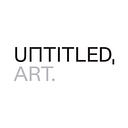Artists on Artists
Osman Can Yerebakan’s Daily Dispatch | December 7, 2019
“But, what do artists think about their colleagues’ works?” I asked myself, and stopped two artists, painter Tsibi Geva and photo-collagist Sheida Soleimani, during their fair rush to ask them favorite artworks from UNTITLED, except their own, of course.
Albertz Benda exhibits Geva’s abstract paintings of gestural brushstrokes in bold tones of red, yellow and brown, prior to his solo exhibition at the gallery’s Chelsea space on January 9. Geva draws cues from architecture and landscapes maimed by sociopolitical conflict and human disruption; his fluid lines and bold splashes vaguely recall façades resisting collapse or occasionally bodies trapped in awe. When I asked Geva what caught his eyes across the booths, he pointed L.A.’s Nino Mier Gallery, where abstraction appears on canvas in a different direction, in pastel tones and airier compositions of paintings by Jana Schröder and Andreas Breunig. The husband and wife duo created another version of their Kunsterverein Heppenheim exhibition, VOTE!, in which their large scale radiant paintings appear on opposite sides of the space and viewers place their votes for “the better painting” into a ballot box. Geva’s dense visual approach to political turmoil, particularly in Israel and Palestine, are rendered for Europe’s current uncertain social landscape in the duo’s whimsical forms and festive colors on white or yellow backdrops. Geva points out Breunig’s freeform hand gestures in Hi_LoRes No83, which recalls touchpad painting experiments on electronic devices with vivid marks of brushstrokes in close inspection.
Soleimani exhibits Italy & Libya, a photograph from her newest series, Reparations Packages, at London gallery Edel Assanti’s booth, continuing her ongoing interest in theatricality and collage in photography with a humorous approach to political economy. Using immersive backdrops and cutout images from a variety of sources, the artist builds colorful and tongue-in-cheek interpretations of political tensions and agreements between the west and east, such as her displayed work that interprets the reparations package signed by Silvio Berlusconi and Muammar Gadaffi governments for the restitution of the headless marble statue “Venus of Cyrene,” looted during the Italian colonization of Libya. Soleimani’s pick is Martin Dudek’s Lyrics of a Well Known Song at Brussels gallery Harlan Levey Projects, which recently won UNTITLED’s Acquisition Prize. The Polish artist uses acrylic paint, image transfer, and cloth tape on wooden panel to convey a blend of intertwined images and references, similar to fluid memories blended into unclarity. “I’m in a firm believer that images shouldn’t offer you an answer upon immediate glance, but that we should work to deconstruct images slowly to understand them,” told me Soleimani, who is amazed by Dudek’s abstraction of photograph of his teenage self to “to question the hierarchy of power and violence, as well as how we read and construct images.” Dudek, similar to Soleimani, subverts photographs’ documentary nature and unearths images’ innate relation to memory and history.
Osman Can Yerebakan
